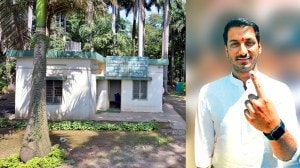What is the Gujarat law the L-G has approved for Delhi, which could give the police more powers
The proposal has been sent to the Ministry of Home Affairs. Officials said the move comes after the Delhi Police wrote to the L-G asking for a stricter law to rein in snatchers and drug peddlers.
 The Delhi Police had written to the L-G asking for a stricter law to deal with snatchers and drug peddlers. (File pic for representation)
The Delhi Police had written to the L-G asking for a stricter law to deal with snatchers and drug peddlers. (File pic for representation) The Delhi Police is likely to get more stringent powers of preventive detention, after Lieutenant Governor (L-G) V K Saxena recently approved a proposal by the Delhi Home Department to extend the Gujarat Prevention of Anti-Social Activities Act, 1985 to the national capital.
The proposal has been sent to the Ministry of Home Affairs.
Officials said the move comes after the Delhi Police wrote to the L-G asking for a stricter law to deal with snatchers and drug peddlers.
What is the Gujarat PASA Act?
The Gujarat Prevention of Anti-Social Activities Act, 1985, provides for preventive detention of “boot-leggers, dangerous persons, drug offenders, immoral traffic offenders, and property grabbers for preventing their anti-social and dangerous activities prejudicial to the maintenance of public order.”
While it was first published in the Gujarat Government Gazette on August 2, 1985, it is deemed to have come in force on May 27, 1985.
In 2020, amendments to the Act brought under its ambit operators of gambling dens and prostitution rackets, offenders of cow-slaughter, sexual offences and cyber crimes, those involved in usury, and repeated offenders of the Arms Act.
What are the rules for detention?
According to Section 3 of the Act, the state government may, if satisfied that “it is necessary to do so with a view to preventing a person from acting in any manner prejudicial to public order, make an order directing that such a person be detained”. The person can be detained anywhere in Gujarat, and be removed from one place of detention to another within the state.
The offender must have more than one FIR filed against him at any police station within the state. However, the offender can be booked under PASA only by an officer whose territorial jurisdiction he resides in.
What criticism has the Act faced?
The authorities have received criticism over the ‘misuse’ of the Act, especially since the criterion of multiple FIRs is often met through complaints filed years ago, for which the detainee has not been convicted. Critics and legal experts argue the Act infringes upon a person’s personal liberty.
Section 6 allows the government to detain an individual on multiple grounds, making separate orders for each ground. Therefore, even if one of the multiple grounds is held ‘invalid’ or ‘vague’ in a Court, the detention order can sustain on the other grounds.
On May 3 this year, the state home department released guidelines asking officials to be “vigilant” before invoking the Act, and said those found in violation would be penalised.
How have PASA detentions fared in court?
According to Gujarat Assembly data provided in September 2021, of the total 5,402 orders to detain people under the PASA Act over the previous two years, as many as 3,447 were cancelled by the Gujarat High Court, that is over 60 per cent. Similarly, a total of 1,620 externment orders under the law were passed in the previous two years and 37 of them were quashed by the HC.
What has the Gujarat HC said about the Act?
The Gujarat HC has frequently noted “non-application of mind” by state authorities.
In 2020, a division bench of the HC, headed by then Chief Justice Vikram Nath (now a SC judge), laid down a set of guidelines for preventive detention orders. These included conveying the detention order in a language comprehensible to the detenue, specific grounds of such an order with each separately and distinctly mentioned, and furnishing documents relied upon for each of these grounds with all details.
The guidelines also laid down that the government shall place all documents concerning the detention orders, along with the detenue’s representation if it’s made, to the Advisory Board within three weeks from the date of the order. The Advisory Board shall consider all material, call for more if necessary, hear the person concerned if he desires to, and then send its report to the government within seven weeks from the date of detention.
In case the person’s representation was not considered by the advisory board, the government shall do so, before passing its order of confirmation on the preventive detention.
In 2020, a division bench of the Gujarat HC had also set a precedent by ruling that “preventive detention matters should be treated as the Habeas Corpus Petitions and a Habeas Corpus Petition, questioning the legality and validity of an order of preventive detention, should be heard by a Division Bench of this Court and not by a Single Judge.”



- 01
- 02
- 03
- 04
- 05



































